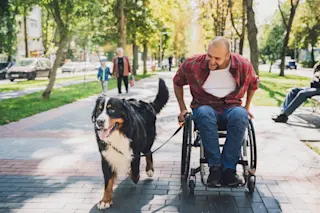Dogs are often trained to help individuals with disabilities. Medical alert dogs keep people safe and companion dogs or therapy dogs bond with humans to provide emotional support. But what is it that dogs really understand? Do they sense when someone has a disability and act accordingly? Or are they simply taught to be patient with someone who needs more care or attention?
There is no definitive answer to confirm that dogs can truly distinguish when someone has a disability, but understanding how dogs relate to us, and how they respond to differences in individuals, can explain quite a bit.
Can Dogs Understand Humans?
Dogs are social. They use physical cues and a range of behaviors to communicate with other dogs and research suggests they use these same skills to read their human companions, says Susan Nilson, a canine behavior professional and founder of The Cat And Dog House.
“When humans are stressed, anxious, angry, happy, or in any other emotional state, their behavior, body language and facial expressions change to reflect how they are feeling. Whether these changes are obvious or more subtle, dogs can often pick up on those cues and interpret them to gauge the person's emotions and intentions,” says Nilson.
Read More: Dogs and Their Owners Share Similar Personality Traits
How Dogs Bond
Christina Billy, director of client services at Canine Partners for Life says that patterns help dogs connect with people and develop a bond. And these bonds are then important for dogs who help their owners in difficult situations or tend to people when they are in need.
“One patient of mine became a therapy dog at a rehabilitation hospital,” says Gay Zambrano, a veterinarian in Southern California. “The dog walked right up to a lady who had a stroke and hadn’t spoken in months, put his head in her lap, and the lady started petting her and talking to her. The dog just knew she was the person to go over to out of a whole room of people.”
Read More: How Does Your Dog Understand You?
Dog Personalities and Relationships
Dogs adjust their behavior when playing with other dogs to make sure the game stays fair and fun for everyone. Similarly, they may also adapt their behavior toward different people in the household. They create relationships with each individual person.
“While they may engage in rough and tumble games with older children or adult family members, they may be calmer and gentler around babies or young children,” says Nilson.
“I think it also comes down to individual personalities. I've had dogs that very obviously preferred my husband no matter how many times I fed them fabulous treats, hung out with them, or took them on great walks, and we've also had dogs who preferred me, no matter what. Other dogs we've had displayed no distinct preference,” says Nilson.
Read More: Why Do Dogs Like Certain People And Not Others?
Do Dogs Have Empathy?
A dog’s reaction varies depending on their innate ability, and different breeds have varying strengths. Some are more empathetic than others, some like to work more and some are more perceptive.
“Some breeds are more self-centered, some can sense when someone needs quiet attention or interaction or is sad or in need of comfort,” says Zambrano, “like the example of the dog who approached the woman who had a stroke.”
Read More: 5 Unusual Ways That Dogs Help Humans
Socialized Dogs Are More Adaptable
But, in general, dogs that are socialized, the ones who have regular and positive exposure to a variety of people and stimuli, are better able to adapt to new situations and remain calm and confident as they learn about someone new, says Billy. For example, if the new sound of the rumbling of a car is paired with food or praise, a dog will create a positive association. Without positive exposure, the same experience could become a scary one.
“So, a well socialized dog that has had positive experiences meeting new and different people are much more likely to be calm […], even if those characteristics are not ones they've encountered before, like a wheelchair, rough head pat or a high-pitched giggle,” says Billy.
At the end of the day, all dogs are different, but the ones who have a heightened sense of empathy, who are tuned into body language and the overall intentions of the person, and who have had positive experiences meeting someone new, will adapt well with individuals with disabilities making them great companions and friends.
Read More: Which Animals Can Be Service Animals?














